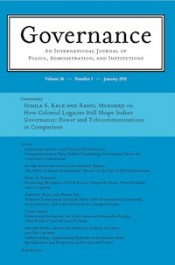Miller and Whitford win Levine Prize
Each year, the International Political Science Association’s Research Committee on the Structure of Governance sponsors the Levine Prize. It is named in honour of Charles H. Levine, who was a distinguished member of the Research Committee and served on the editorial board of its official journal, Governance. The prize is awarded on the recommendation of a distinguished committee. This year’s committee was composed of Professors Tobias Bach (University of Oslo), Caspar van den Berg (Leiden University), and Ting Gong (City University of Hong Kong).
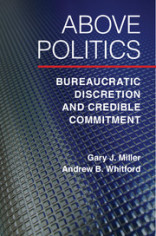 The Award Committee has selected Above Politics: Bureaucratic Discretion and Credible Commitment by Gary J. Miller and Andrew B. Whitford as the 2017 recipient of the Levine Award. This interesting book turns much of the conventional wisdom about opportunistic and self-interested bureaucrats as the main problem of democratic governance upside down. Through a series of insightful vignettes and case studies, the authors powerfully argue that the moral hazard faced by politicians is a more serious problem than the proverbial runaway bureaucracy. They emphasize the benefits of a professionalized bureaucracy as a key element of checks and balances in the US system of separated powers and highlight the problematic effects of politicization on policy effectiveness. Written in an accessible style, the book will be useful as a reading for courses in different fields. Read the rest of this entry »
The Award Committee has selected Above Politics: Bureaucratic Discretion and Credible Commitment by Gary J. Miller and Andrew B. Whitford as the 2017 recipient of the Levine Award. This interesting book turns much of the conventional wisdom about opportunistic and self-interested bureaucrats as the main problem of democratic governance upside down. Through a series of insightful vignettes and case studies, the authors powerfully argue that the moral hazard faced by politicians is a more serious problem than the proverbial runaway bureaucracy. They emphasize the benefits of a professionalized bureaucracy as a key element of checks and balances in the US system of separated powers and highlight the problematic effects of politicization on policy effectiveness. Written in an accessible style, the book will be useful as a reading for courses in different fields. Read the rest of this entry »
Book reviews: Do-it-yourself democracy, smarter states
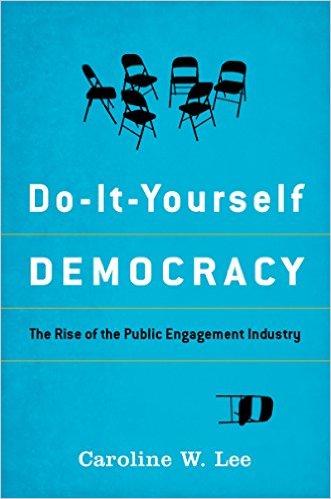 In the current issue of Governance, Robert Chaskin reviews Do-It-Yourself Democracy by Caroline W. Lee. Lee’s analysis is “unsettling,” Chaskin says, showing how deliberative processes can be designed “in ways that legitimize cost cutting and retrenchment and that promote participant alignment with state or corporate requirements for austerity. Read the review. And Scott Fritzen reviews Smart Citizens, Smarter State by Beth Simone Noveck. The book “makes an impassioned plea for ‘reinventing government’ in the twenty-first century.” Fritzen says that Noveck’s analysis is “nuanced, grounded in historical analysis, practical experience in government, multiple disciplines and a close reading of democratic and institutional theory.” Read the review.
In the current issue of Governance, Robert Chaskin reviews Do-It-Yourself Democracy by Caroline W. Lee. Lee’s analysis is “unsettling,” Chaskin says, showing how deliberative processes can be designed “in ways that legitimize cost cutting and retrenchment and that promote participant alignment with state or corporate requirements for austerity. Read the review. And Scott Fritzen reviews Smart Citizens, Smarter State by Beth Simone Noveck. The book “makes an impassioned plea for ‘reinventing government’ in the twenty-first century.” Fritzen says that Noveck’s analysis is “nuanced, grounded in historical analysis, practical experience in government, multiple disciplines and a close reading of democratic and institutional theory.” Read the review.What drives legitimacy in post-conflict societies?
 Rebuilding institutional legitimacy is essential for stability in postconflict societies. But what factors influence citizen perceptions of legitimacy? Kylie Fisk and Adrian Cherney answer the question using data from a nationwide study of post-conflict governance in Nepal. They find that the relationship between service delivery and legitimacy “is not as simple as previously assumed.” Procedural justice is more strongly associated with perceptions of legitimacy than instrumental outcomes such as service delivery, distributive justice, and outcome favorability. Read the article.
Rebuilding institutional legitimacy is essential for stability in postconflict societies. But what factors influence citizen perceptions of legitimacy? Kylie Fisk and Adrian Cherney answer the question using data from a nationwide study of post-conflict governance in Nepal. They find that the relationship between service delivery and legitimacy “is not as simple as previously assumed.” Procedural justice is more strongly associated with perceptions of legitimacy than instrumental outcomes such as service delivery, distributive justice, and outcome favorability. Read the article.
Explaining the ebb and flow of legislative power
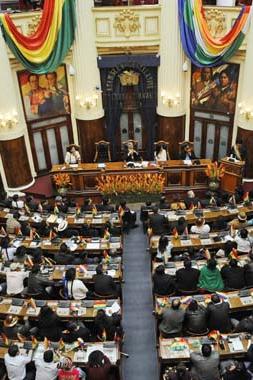 The balance of power between executive and legislative branches in Latin American governments has varied significantly over time. But this is not the result of changes in the formal division of powers between the two branches. What explains the ebb and flow of legislative strength? Sarah Shair-Rosenfield and Alissandra Stoyan argue that a key factor is “legislator professionalization,” which they define as a function of prior legislative and professional work experience. Examining the track record of four Latin American countries, they find that legislaturesare more likely to curb executive power when legislators are strongly professionalized, controlling for constitutional provisions and several other factors. Read the article.
The balance of power between executive and legislative branches in Latin American governments has varied significantly over time. But this is not the result of changes in the formal division of powers between the two branches. What explains the ebb and flow of legislative strength? Sarah Shair-Rosenfield and Alissandra Stoyan argue that a key factor is “legislator professionalization,” which they define as a function of prior legislative and professional work experience. Examining the track record of four Latin American countries, they find that legislaturesare more likely to curb executive power when legislators are strongly professionalized, controlling for constitutional provisions and several other factors. Read the article.How US public service executives make decisions
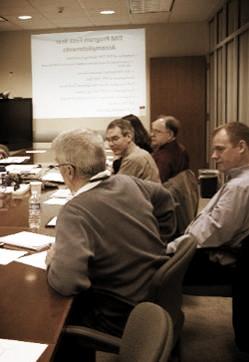 Senior government executives often depend on groups of advisors to help them overcome the challenges of decisionmaking. But this raises the risk of “groupthink.” In a study of executives in the US federal government, Steven Kelman, Ronald Sanders, and Gayatri Pandit find that the dominant technique for avoiding technique is vigilant decisionmaking, which involves active solicitation of dissenting views and close scrutiny of alternatives. But successful executives are also found to have a bias for action. “What distinguishes outstanding executives,” the authors find, “is not vigiliance but decisiveness.” Read the article.
Senior government executives often depend on groups of advisors to help them overcome the challenges of decisionmaking. But this raises the risk of “groupthink.” In a study of executives in the US federal government, Steven Kelman, Ronald Sanders, and Gayatri Pandit find that the dominant technique for avoiding technique is vigilant decisionmaking, which involves active solicitation of dissenting views and close scrutiny of alternatives. But successful executives are also found to have a bias for action. “What distinguishes outstanding executives,” the authors find, “is not vigiliance but decisiveness.” Read the article.
How politicians survive the media cyclone
 Advances in information technology have produced a “media cyclone” — a “noisy, fragmented, pressure-filled media landscape.” In the current issue of Governance, Alex Marland, J.P. Lewis and Tom Flanagan use recent Canadian history to explain how politicians respond. Politicians turn to branding: “a corporate philosophy that seeks to unite every employee activity and communications touchpoint toward a common purpose.” Branding requires tight centralization of control over communications. It also blurs the lines between party government and public service. Despite the dangers, branding “can be expected to last, regardless of which party or leader is in control.” Read the article.
Advances in information technology have produced a “media cyclone” — a “noisy, fragmented, pressure-filled media landscape.” In the current issue of Governance, Alex Marland, J.P. Lewis and Tom Flanagan use recent Canadian history to explain how politicians respond. Politicians turn to branding: “a corporate philosophy that seeks to unite every employee activity and communications touchpoint toward a common purpose.” Branding requires tight centralization of control over communications. It also blurs the lines between party government and public service. Despite the dangers, branding “can be expected to last, regardless of which party or leader is in control.” Read the article.How politicians survive information overload
Elite politicians live in an “information maelstrom,” Stefaan Walgrave and Yves Dejaeghere observe in a new article for Governance. How do they decide select the information they pay attention to? Walgrave and Dejaeghere draw on interviews with top Belgian politicians, including all party leaders. They describe three general strategies that are used by politicians to manage overload: organizational procedures designed to shield them against raw information; personal heuristics to sort out what really matters; and an attitude of self-confidence that “at least makes them feel in charge of the incoming signals.” Read the article.
